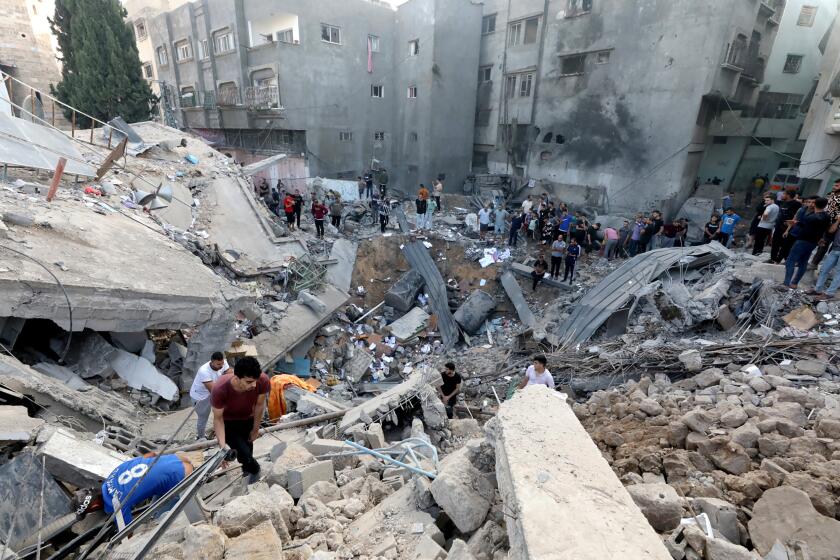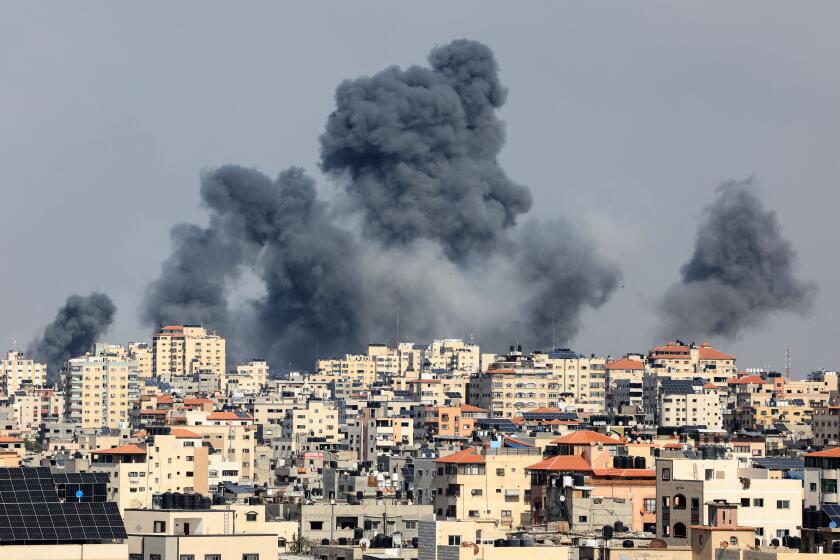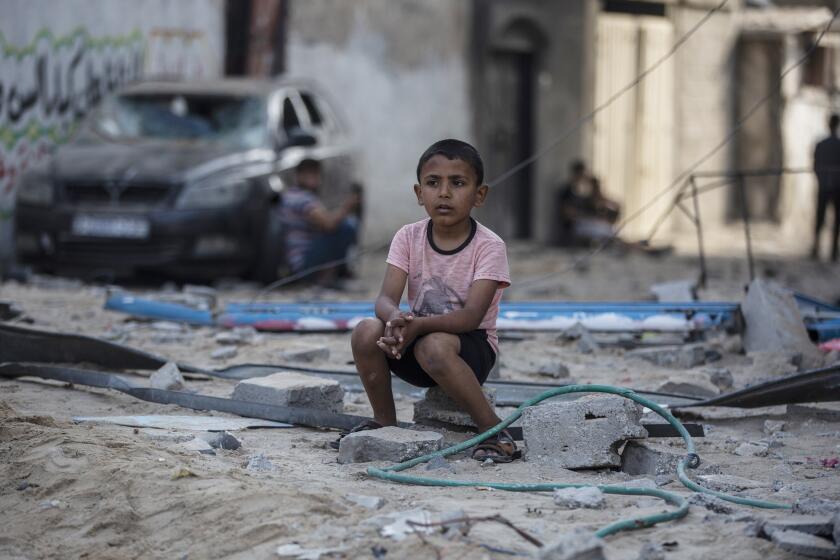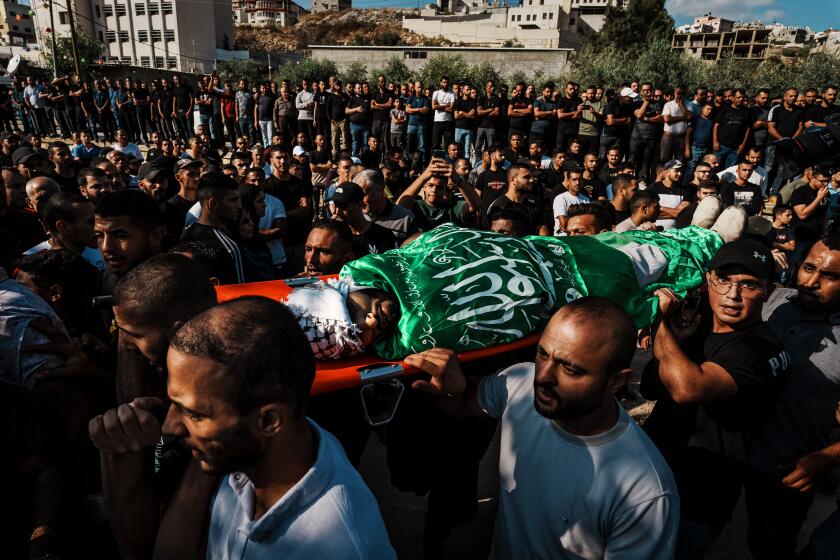Opinion: Gaza’s techies were dreamers and builders. After Israel’s bombs, their stories shatter my heart
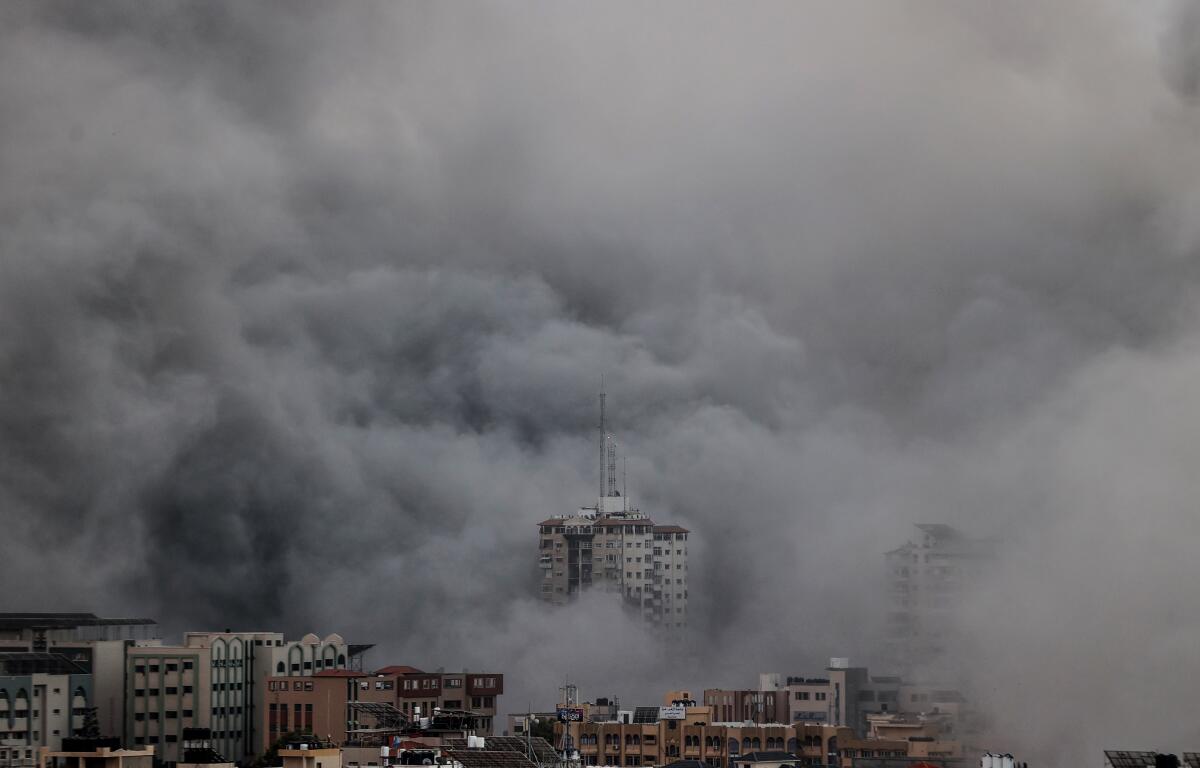
- Share via
In 2017, I moved to Gaza for a job at Gaza Sky Geeks. The Google-backed co-working space, startup hub and coding school trained thousands of young Palestinians and connected them to remote jobs in the global tech industry. As a Pakistani American international development professional, I worked with GSG, as we called it, for five years alongside a local team of promising, bright individuals — with university degrees ranging from computer science to English literature. Together, we built bridges between Gaza and the outside world, forging partnerships with companies such as Amazon and creating new opportunities for the people of Gaza.
The Palestinian tech ecosystem — which included international and local nongovernmental organizations, companies and universities that were actively building a viable and prosperous Palestinian future — has been crushed over the last month. I’ve watched everything we’ve built get leveled to the ground by the Israeli bombardment, along with the rest of Gaza.
Palestinian Christians were killed in an Israeli airstrike at St. Porphyrius Greek Orthodox Church in Gaza. We pray for peace but fear our presence may disappear altogether.
GSG was a vibrant community center for Palestinian tech nerds and hipsters located in the heart of bustling Gaza City. A neon mural of the word “entrepreneurs” written in Arabic lit up the main co-working space. We took group photos there when students graduated from our coding boot camp, or when we celebrated a visit from one of the hundreds of Silicon Valley and other international tech experts visiting Gaza to teach and experience the richness of Gazan culture.
I worked with dreamers, builders of a world that did not yet exist, a world withheld from them by nearly two decades of Israel’s blockade. This community created a semblance of normalcy and freedom for Gazans, directly improving an untenable Palestinian status quo, and by extension, the Israeli one too.
As Israel is poised for a ground invasion of Gaza, and bombing continues, people fear that the goal is to empty the place of Palestinians.
The GSG community exemplified Palestinians who heeded the Western mantra of pulling oneself up by the bootstraps — who chose peace — despite the suffocating weight of Israel’s oppression. All life in Gaza is precious though, not just those who moved in accordance with Western standards. Yet Palestinians are always asked to prove the value of their lives and their worthiness of protection.
Israel’s blockade on Gaza strangled every aspect of life for the GSG community — academic scholarships canceled due to denied exit permits, job interviews missed due to electricity cuts and homes destroyed by routine air raids.
Still, these Palestinians, like millions of others, are the ones who not only abstained from violence against their oppressor, but went above and beyond to lay the groundwork for a prosperous Gaza. They have not been spared by Israel’s military strategy. Like the vast majority of Gazans, they had nothing to do with the decisions unilaterally taken by Hamas on Oct. 7, or any day prior.
Israel struck the Jabaliya refugee camp in the Gaza Strip Tuesday. Palestinians have experienced a long cycle of displacement within and beyond Israel’s borders.
Every day I wake up to desperate messages from my friends — every story shatters my heart.
Do I tell you about Mahmood, our charismatic community manager, whose new home was destroyed a month after his wedding? He is now sheltering with 38 family members, rationing insulin for his mother.
Adhering to the false pro-Israel/pro-Palestinian dichotomy frustrates our ability to speak with intellectual honesty and moral clarity.
Do I tell you about Tala, our international mentor coordinator, who is looking after her younger brother, who is in a wheelchair, in the south — a so-called “safe zone” that Israel is bombing? Her entire family was turned away from the Egyptian border crossing in their attempt to escape the violence.
Or how about Omar? A deeply earnest alumnus of a U.S. study abroad program, he was able to exit Gaza with a Jordanian passport, after making the impossible decision of separating from family. Omar has made it to Amman, where he wonders if he’ll ever return to Gaza in his lifetime, or if there will even be a Gaza to return to.
Should I eulogize Mai, a top graduate of our coding program who landed a Google-backed internship and dreamed of building a startup to support people with disabilities? Mai used a wheelchair. She, along with her entire family, was killed by an Israeli airstrike last week.
If Israel and America truly cared about and supported a viable Palestinian and Israeli future, they would take genuine measures to safeguard civilian life — the lives of Mahmood, Omar and Tala. The life Mai would have lived.
Instead, 10,000 Palestinian lives and counting have been taken by Israel’s indiscriminate campaign of vengeance and collective punishment. Thousands more are trapped beneath rubble. Craig Mokhiber, who recently resigned from his post at the U.N.’s human rights office, calls it a “textbook case of genocide.”
The policy that Israel has chosen to use against Gaza might make Israelis feel safer in the immediate term, but what about those in Gaza who would form the backbone of a peaceful future? How can this war achieve anything but another toxic cycle of violence?
Before Oct. 7, Gazans found a way to build within the confines of their prison. After Oct. 7, Palestinian choice has dwindled to two options. My friend Mahmood explained these choices to me in a message sent this week, one month into Israel’s war on Gaza:
“Now we are facing two options — a slow death from lack of food, water, medicine and electricity. Or, a hopefully quick death from an air strike.”
An immediate cease-fire and end to the Israeli occupation are prerequisites for a peaceful future.
We can create a world where Palestinian and Israeli safety is not mutually exclusive. That world begins with giving Mahmood more choices. It begins with protecting the creators of a Palestinian future, not extinguishing them.
Anam Raheem is a Pakistani American writer based in New Jersey.
More to Read
A cure for the common opinion
Get thought-provoking perspectives with our weekly newsletter.
You may occasionally receive promotional content from the Los Angeles Times.
